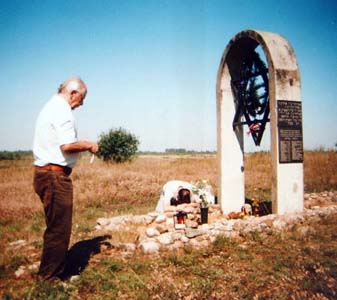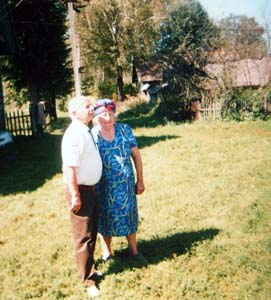NUMBER 317
Grigory Meyerovich Skoblev and his son Mikhail came to Sirotino from the ancient German city of Bremen not just for a visit. They were brought here by bitter tragic memories of the years of the Great Patriotic War.
- I will soon turn eighty, - he says, but I have to see the place where my close people perished.
Grisha was born in a place called Sirotino, where he spent his childhood years. His parents used to work on a collective farm. They lived a modest life – they had a big family and all the boys used to sleep in one big bed. Grisha was a good student at school, keen on assembling detector radios and making kites.
The family had a custom: the children, who finished their school year with excellent grades, visited aunt Mira in Vitebsk for two weeks, where they went to the cinema, ate ice cream and crusty buns. The kids always looked forward to it.
Grisha managed to finish his prewar school year better than his brothers, so he was sent to Vitebsk to see aunt Mira. But… there was the war.
Grigory remembered the day of June 23rd, when collective farm workers decided to hide the tractors and combines in the woods. Nobody believed that the war would last very long and be so bloody.
Three days later the German planes detected the machines and bombed them. Soon everyone saw Red Army soldiers retreating through Sirotino. The Skoblev family then decided to move to the village of Starinki, where their friends lived.
 Grigory Meyerovich Skobelev and his son Mikhail
Grigory Meyerovich Skobelev and his son Mikhail
at the memorial to the Jews, executed in Sirotino.
The German Army occupied Sirotino at the beginning of June. There were a lot of soldiers and they looked very excited and joyful – sure of an easy victory. They treated the local children with chocolate, sang songs and went sunbathing on the river Chernitsa. The weather was hot and they walked in the village half-dressed. At the same time the German troops were incessantly travelling the road from Vitebsk to Polotsk – it was impossible to cross the road.
So, a person from Sirotino came to Starinki and said: “Come back, the Germans won’t hurt you. They only give kids candy and sunbathe as if they were at a resort.”
So, the family came back to Sirotino. Some time later shepherds found out that the Red Army was moving towards the village. And soon the Soviet artillery hit Sirotino. It was followed by hand-to-hand fighting. The half-dressed Germans started running hectically.
The Skoblevs rushed towards the forest but then they remembered that grandmother Malka had been left at home. Mishnevskaya Street was on fire but the house where they lived remained intact. Grandmother Malka was lying on the floor and praying. Grisha, who was 12 at the time, took her out of the house. When crossing the street with her, he was astonished to see it covered with corpses of the German soldiers.
The fight lasted for two hours but soon more Germans arrived and a new artillery shelling began. Since the Skoblevs’ house was now burnt down, they had to stay with aunt Sonia.
The new regime soon showed its ugly face – the Germans began humiliating and arresting the locals. One of the synagogues was turned into a stable, the other – into a garage.
In the middle of August several new German trucks arrived. The Jews were told to get into them. They were informed they would be taken to a settlement on the outskirts of Vitebsk, a fabulous place, they claimed. Many people later realized what kind of trucks those were – the mobile gas chambers, disguised with tarpaulin… Grigory Skobelev took his father’s clothes and documents, and being a naïve child, decided to walk towards the “fabulous settlement” near Vitebsk, where everyone would be happy. Thus he reached Vitebsk, asking the people he met on the way where that settlement was, but they seemed to be unaware.
At the end of August, 1941, all the Jews, who remained in the village, were moved into a ghetto. The ghetto consisted of five or six barracks, in which collective farm worker families used to live before the war. The place was guarded. The prisoners could eat only what they managed to find.
 G.M. Skobelev and his prewar acquaintance
G.M. Skobelev and his prewar acquaintance
L.S. Suhanova in Sirotino, 2006.
On November 17th a new Nazi team arrived in the village. Now every house was guarded. The guards spoke to each other and Grisha’s mother, who understood German, heard that the Jews would be executed the following day. On November 18th, in the morning, she took a ladder and told Grisha to climb to the attic and hide himself there. Then she took the ladder away.
The day was frosty and the streets were already covered with snow. The boy hid himself in the straw on the attic and did not move. Soon it turned out that two more girls, both about eight years old, were hiding there.
Grisha heard the locals crying and the Germans shouting. He hushed the girls and ordered them to remain silent. Grisha saw that the column of prisoners, which included his mother and brothers, was taken towards Pligovki. Soon he heard shooting and an abrupt silence.
Then Grisha, together with the girls, came down and walked towards Mishnevichi. Having walked about two kilometers they turned around and saw the Sirotino ghetto was burning like a huge candle.
He ordered the girls to walk towards Koziany. As for himself, he was determined to reach Leningrad, where his father’s relatives lived.
- I was a boy, - he admits today, - and could not understand everything. I did not suspect it would be a hopeless idea. I only had my birth certificate and a jar of duck fat…
On the fourth day the boy, drained by the long walk, reached an isolated farmstead where no one lived. The jar with fat helped a lot and gave him the strength to continue.
Grisha invented a story that he came from an orphanage in Smolensk, which had been bombed. A week later he arrived in Nevel and asked a local woman to give him shelter. The middle-aged woman gave him food and let him stay for a day. He asked her for the way to Velikiye Luki and continued his trip. The town was crowded with Germans – one could feel that the battlefront was somewhere nearby.
While walking in the town he met a young woman and asked her for bread. She gave him bread and some cow bones and then took him to the municipality. They decided to send Grisha to a refugee camp. Soon the boy realized what kind of camp it was – people died there every day: the residents were fed twice a day with skilly and made to do dig trenches. He wanted to escape from the camp but it was too late.
On a winter day the camp residents were ordered to get on the trains and told they would be taken westwards. They reached Vileika and then were told to get on a train that would take them to Germany. Grisha felt something was wrong and made up his mind to get away. Nobody noticed him and he escaped.
He then reached the town of Miadel. There he found a farm where he was allowed to stay and work. The owner of the farm said he would not pay Grisha anything, but he could live in a barn. He was given several glasses of milk, a handful of flour and some peas daily. He used that to cook soup.
The boy worked on the farm until Miadel was liberated – he was 15 by that time.
Now, 66 years later, he came to Sirotino. We helped him find the street where his family used to live. We met L.S. Suhanova, who had all her life lived in Sirotino and they had known each other very well as children. Then we headed for the monument – the execution site of his relatives.
“316 Soviet citizens were shot here”, - he pronounced the first words, inscribed on the monument, in pain…
- Hello, my closest people, - whispers Grigory Meyerovich. – I am your number 317…
Anton Paraskevin,
Shumilino regional newspaper “Geroy pratsy”
P.S. Shumilino museum has a list of Sirotino Jews, executed by fascists on November 18th, 1941.
The Lupilo family, 6 people;
The Scherbakovsky family, 8 people;
The Kazel family, 8 people;
The Beilinson family, 4 people;
Epstein;
Beilinson;
The Mihola family, 2 people;
The Smotkin family, 2 people;
The Scherbakovsky family, 2 people;
Perhaps with your assistance we can find out the names of other victims of the fascists’ genocide
|

